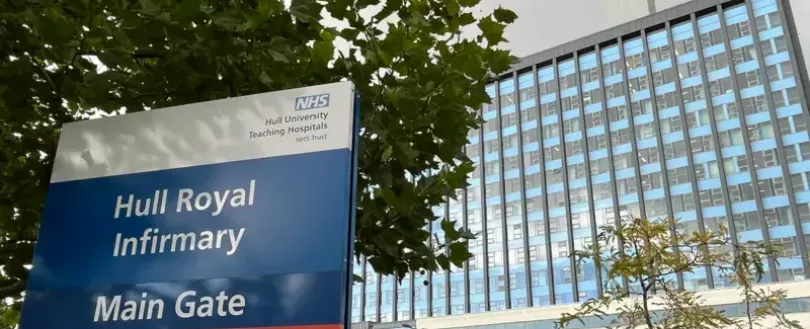
Hull Royal Infirmary Ordered to Remove Non-Compliant Cladding
Like it? Share it!
15 September 2025
Hull Royal Infirmary has been instructed to remove the cladding from its 13-storey tower block after it was found to no longer meet current fire safety legislation.
The Humber Health Partnership, which operates the hospital, confirmed that while the insulation and cladding complied with building regulations when installed in 2013–14, changes in the law introduced in 2022, following the Grenfell Tower inquiry, mean the materials are now deemed non-compliant.
Despite the enforcement action, the Trust has emphasised that the building remains safe. It highlighted the presence of 600 fire wardens and “one of the best fire alarm systems”.
Tom Myers, group director of estates, facilities and development at Humber Health Partnership, explained that “issues” were identified during a routine review earlier this year. He said:
“The system doesn’t really meet current building standards and, although building regulations aren’t retrospective, there was an item that concerned us that we raised with Humberside Fire and Rescue Service.”
Mr Myers reassured patients, staff, and visitors:
“I would say we are one of the safest buildings. Hospital buildings are much safer than residential buildings. We also have 600 fire wardens and we have one of the best fire alarm systems within there, so there’s nothing to be concerned about from a safety perspective.”
In July, Humberside Fire and Rescue Service issued an Enforcement Notice, requiring the hospital to upgrade the materials and implement additional safety measures until the work is completed. The fire service stated its officers are working closely with the hospital and are “satisfied with both the proposed works and the fire prevention measures currently in place during the construction period.”
The works are expected to take around 20 months to complete, although the start date and costs remain unknown as the tendering process is still at an early stage.
The cladding and insulation, which met regulations when first installed, now fall short of the requirements of the Building Safety Act 2022. The Act was introduced following the Grenfell Tower tragedy in which 72 people lost their lives in June 2017, after combustible cladding fuelled the rapid spread of the fire.
Healthwatch East Riding of Yorkshire, the local patient advocacy group, welcomed the safety improvements but raised concerns about how the extensive building work might affect patient care. It has asked for reassurances, particularly for those with access needs, as services are already under pressure.
View the source.
Our eNews provides regular insight into industry trends, news headlines, and product and service information. For more articles like this Subscribe to our enews.
Related news
-
Record Rise in E-Bike and E-Scooter Fires Across London
28 January 2026
Related resources
-
Passenger Service Vehicle - Guidance Note
05 September 2023
